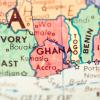With more illnesses and deaths reported today in West Africa's Ebola outbreak, health ministers from 11 African nations and their global health partners wrapped up a 2-day emergency meeting in Accra, Ghana, adopting a basic strategy to battle the disease and agreeing on a list of challenges they need to tackle.
In a statement issued at the end of the meeting, the group said the outbreak poses a threat to all countries in the region and beyond, and they called for immediate action, according to a report today from the World Health Organization (WHO). The ministers aired concerns about the social and economic disruptions caused by the outbreak and said coordinated cross-border actions are needed by stakeholders, national leaders, and community members.
The outbreak began in March, and health officials thought they had it under control in May. But in June the disease spread to new areas in all three affected countries—Guinea, Sierra Leone, and Liberia—as illness numbers surged. The event has become the largest Ebola virus disease (EVD) outbreak since the first human illnesses were identified in 1976.
Cases rise by 21, deaths by 14
In a separate statement today, the WHO said between Jul 1 and 2, the three countries reported 21 more cases and 14 more deaths, pushing the outbreak total to 779 illnesses, including 481 deaths. Guinea reported 2 deaths, Liberia reported 8 cases and 10 deaths, and Sierra Leone reported 13 cases and 2 deaths.
Three factors responsible for continuing disease transmission are cultural practices and mistrust that are resulting in high-risk actions, such as hiding EVD patients, treating them at home, and handling dead bodies according to local customs. The actions are making it difficult for health officials to trace contacts and identify and isolate new cases.
Other factors include extensive cross-border movements, which have led to the rapid spread of the disease and an extremely large area affected, which is straining the capacity to respond to the outbreak.
Emergency plan takes shape
In meeting developments, the WHO said it will establish sub-regional control center in Guinea to coordinate technical support coming to West African nations from global groups and to help mobilize resources. Health ministers also highlighted the importance of the WHO's role in promoting research on EVD and other hemorrhagic fevers.
Elements of the international strategy that the health ministers adopted include convening meetings of key government ministries and other stakeholders to map out an implementation plan and recruit community, religious, and political leaders to help improve the public's awareness and understanding of the disease.
The EVD outbreak is West Africa's first, and the public's denial about the disease and suspicions and misconceptions around treatment and response activities have fueled the disease's spread and have been stumbling blocks to response steps, such as contact tracing.
The plan agreed to by the health ministers also includes strengthening surveillance, case finding, reporting, and contact tracing; deploying more human resources to hot spots; and identifying and committing domestic financial resources to battle the outbreak.
Health officials agreed to organize cross-border consultations to ease the flow of information and share information with countries that have experience in responding to Ebola outbreaks.
They urged global health partners to continue sending technical and financial support and strongly urged the Economic Community of West African States (ECOWAS) Heads of States summit to addresses the outbreak.
Ministers outline challenges
Some of the gaps and challenges the group identified are outbreak coordination, financing, communication, cross-border collaboration, logistics, case management, infection control, surveillance, contact tracing, community participation, and research.
The 2-day emergency meeting was designed to produce a plan to speed outbreak response, blunt the social and economic impacts, and prevent future outbreaks.
See also:
Jul 3 WHO press release
Jul 2 WHO outbreak update
Jul 2 WHO press release
Meeting agenda and background




















